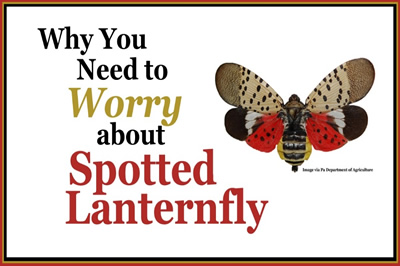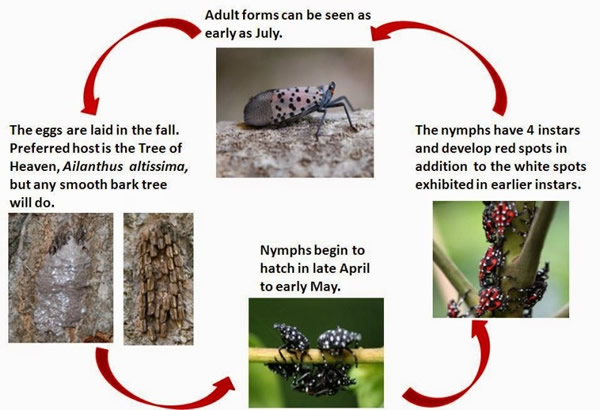Spotted Lanternfly
CLICK TO REQUEST EVALUATION OR TREATMENT
 What is it and how did it get here?
What is it and how did it get here?
Spotted Lanternfly (SLF) is an invasive insect from Asia that was discovered in Berks County, 50 miles west of Philadelphia, in 2014. It is a highly destructive pest of trees, native and non-native, plus grapes, apples and other agricultural crops. It probably arrived in an egg stage on pallets from China, Vietnam and/or India. It has spread rapidly and has been found in 13 Pennsylvania counties, Delaware, Maryland, New Jersey and New York.
Does it kill trees and other plants?
Probably. Trees and other plants that have been affected by this pest for several years are definitely in severe decline. Growers of grapes, apples and hops have, are or will be, experiencing billions of dollars in losses. Residential and commercial properties are expected to suffer a similar fate with trees and shrubs that are destroyed. This is a very serious problem!!
Do you have them in your neighborhood?
Simple answer for SE Pennsylvania: if you don’t yet, you will!
 Identification and life cycle
Identification and life cycle
There is one generation of SLF per year. The eggs are laid in late Fall and hatch in the Spring. Egg masses are laid on hard surfaces such as trees, decks, houses, outdoor equipment, etc. Each egg mass contains 30-50 eggs. After hatching in April and May, but before becoming adults, SLF goes through four ¼” to ½” nymph (juvenile) stages. The first three stages (instars) are all black with white spots and the last instar is red with white spots and black stripes. All of these stages are hard to find. SLF adults emerge in July and they are definitely not hard to find.!! They are large, over one inch, and are highly mobile. Adults have black bodies with brightly colored wings. Only adults can fly. Because they jump more than fly, their wings often remain closed. SLF wings are gray with black spots.
Feeding Damage
SLF is capable of causing serious damage to its host, including oozing sap from the trees, wilting, leaf curling and death. SLF feeds using a piercing-sucking mouthpart tapped into the plant like a straw. When SLF feeds, it also excretes honeydew, or a sugary water. This creates a sticky surface on and around plants that encourages the growth of black sooty mold. This mold is harmless to people but causes considerable damage to plants. If you see black sooty mold or sticky areas on a plant or tree it may be infested with SLF. However, other insects can cause similar symptoms. Therefore, it is important to identify the cause of the mold because control measures for other pests may differ from SLF. Contact an ISA Certified Arborist who is a licensed pesticide applicator for diagnosis and treatment options. There is no way to prevent SLF from moving onto your property. The SLF is very mobile and management actions would have to be continuous to keep them off your property. Totally unrealistic!
Treatments
- Egg scraping: removing the eggs in the Winter and early Spring
- Tree banding: wrapping the trunk of affected trees with sticky tape will trap numerous nymphs in the Spring
- Host removal: Tree of Heaven (Ailanthus altissima) is the preferred host tree and, if possible, they should be removed
- Chemical control: insecticides can be contact, systemic, or both and may vary greatly in the length of control (residual action) after application. Treatment should be done by a certified pesticide applicator.
All of the treatments listed above can be helpful in saving specific plants or, least, slowing down the spread of this very serious problem. However, as spelled before, none of these treatments will keep SLF from moving onto your property.
This information has been presented courtesy of Keystone Tree Experts, Doylestown, PA 18901. If you have additional questions or would like us to examine your Spotted Lanternfly situation (assuming that you’re in our service area), please contact us. We have 6 ISA Certified Arborists on staff, with a combined 209 years of tree and shrub care experience. We have EXPERTS in our name for a reason. And, oh yes, this is our 51st year in business.
CLICK TO REQUEST EVALUATION OR TREATMENT


